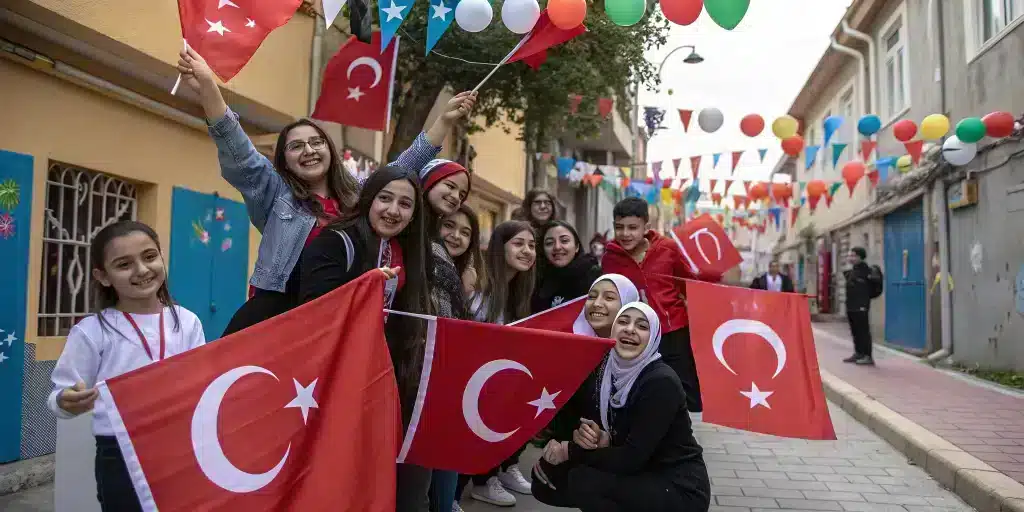Celebrating National Holidays in Turkiye as a Student
Quick Navigation
Republic Day (Cumhuriyet Bayramı) — 29 October
Republic Day marks the proclamation of the Turkish Republic in 1923. It is considered the most important national holiday in Turkiye. Celebrations include performances, processions with Turkish flags, musical bands, and activities in local stadiums.
Student Involvement: Universities like Medipol University and Istinye University often organize special events such as theatrical performances, poetry readings, and traditional Turkish dances. Students are encouraged to actively participate in these events, fostering a sense of community and national pride.
National Sovereignty and Children’s Day (Ulusal Egemenlik ve Çocuk Bayramı) — 23 April
This holiday is dedicated to children and commemorates the foundation of the Turkish Grand National Assembly. Universities and schools engage in student performances, ceremonies, and school-wide activities.
Student Engagement: It provides students with opportunities to engage in cultural and artistic presentations, showcasing their talents and creativity. This day often encourages interdisciplinary collaboration among students from various faculties.
Commemoration of Atatürk, Youth and Sports Day (Atatürk’ü Anma, Gençlik ve Spor Bayramı) — 19 May
This day honors Mustafa Kemal Atatürk, the founder of the Turkish Republic, and is closely related to the youth of the nation. Schools and universities often hold sports competitions and youth festivals.
Celebrations: Institutions such as Bahcesehir University organize sports events, uniting students from different disciplines under the banner of friendship and cooperation while promoting physical fitness.
Victory Day (Zafer Bayramı) — 30 August
Victory Day celebrates the Turkish military victory in 1922, seen as a pivotal moment in the country’s War of Independence. The day is characterized by ceremonies, parades, and public gatherings.
University Involvement: Educational institutions like Aydin University actively participate in commemorative events, hosting discussions about the significance of the day in shaping modern Turkiye.
Labour and Solidarity Day — 1 May
This day relates primarily to workers’ rights, with schools and universities closing for the occasion. Students may join public events or reflect on the significance of the day.
Awareness: It serves as a reminder for students about the importance of labor rights within their communities, encouraging activism and participation in social issues.
Democracy and National Unity Day — 15 July
Established to remember those who defended democracy during the attempted coup in 2016, this day is commemorated with ceremonies and events at educational institutions.
Educational Impact: Universities such as Uskudar University use this day to discuss democracy’s values and the importance of civic engagement among the youth.
Religious Holidays
Ramazan Bayramı (Eid al-Fitr) and Kurban Bayramı (Eid al-Adha): These significant religious holidays in Turkiye see universities closing during these periods. Students may join cultural or communal Iftar meals, enabling them to experience Turkish religious traditions first-hand. The dates of these holidays shift annually due to the lunar calendar.
Student Experience and Participation
University Events
On national holidays, universities frequently organize campus-wide activities that encourage both Turkish and international students to participate. These activities may include art exhibitions, concerts, special lectures, and communal gatherings, providing platforms for collaboration among diverse student populations.
Public Life
Most national holidays lead to the closure of universities, government offices, and many businesses. This creates an opportunity for students to travel, engage in local festivals, or join public celebrations. Participating in such events broadens students’ horizons and enriches their cultural experiences.
Cultural Immersion
Participating in holiday festivities allows students, especially internationals, to gain a deeper understanding of Turkish values, history, and social customs. Active engagement in these traditions fosters a greater sense of belonging and enhances the overall educational experience. It also develops important soft skills such as community involvement and cultural awareness.
Summary Table: Major National Holidays for Students
| Holiday | Date | Typical Student Activities |
|---|---|---|
| Republic Day | 29 October | Campus events, parades, performances |
| National Sovereignty and Children’s Day | 23 April | Student shows, ceremonies |
| Youth and Sports Day | 19 May | Sports, youth festivals, commemorations |
| Victory Day | 30 August | Parades, school commemorations |
| Labour and Solidarity Day | 1 May | Public gatherings, school closure |
| Democracy and National Unity Day | 15 July | Ceremonial events |
| Ramazan Bayramı (Eid al-Fitr) | Varies | Family gatherings, cultural experiences |
| Kurban Bayramı (Eid al-Adha) | Varies | Observances, community participation |
Celebrating national holidays as a student in Turkiye not only provides breaks in the academic calendar but also creates memorable and meaningful experiences, connecting students with the heart of Turkish society.
By actively engaging in these celebrations, students from various educational backgrounds can foster lasting friendships and a deep appreciation for Turkiye’s rich cultural heritage.
Take the Next Step with Study in Turkiye
Explore further opportunities for your educational journey in Turkiye. We are dedicated to supporting international students to embrace cultural experiences that enrich their studies.

